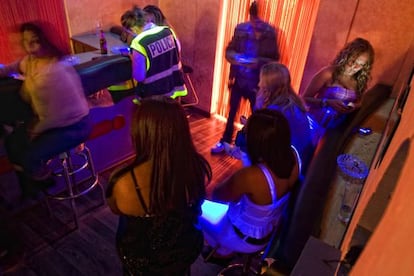Fight against sex trafficking to focus on clients, minister announces
Second phase of police operation will concentrate on prevention by raising awareness Measures will include new fines for potential customers, and social media campaigns


The head of the National Police, Ignacio Cosidó, has announced that the Spanish authorities are planning to ramp up the pressure on clients of prostitutes to an “unbearable” level. The measures will come as the second phase of a plan to tackle human trafficking, which was presented by Cosidó and Interior Minister Jorge Fernández Díaz in Barcelona on Monday morning.
The next phase of the operation will focus on prevention by raising awareness among the general public, in particular potential clients for sexual services.
“There are a lot of very ambitious objectives, as is appropriate for the scourge that we are faced with,” the minister explained, adding that human trafficking in Spain moves €5 million a day.
Fernández Díaz stated that his aim was to see Spain become an international reference point for the battle against human trafficking, as it already is for security – the European Union’s statistics office has ranked Spain third in the list of member countries with the lowest criminal activity.
The minister explained that Spanish authorities would be able to use the future Citizen Safety Law to combat the problem, given that the legislation will permit sanctions for clients who solicit sexual services near to places used by minors, such as schools and playgrounds.
Fernández Díaz also announced that fines would be levied on anyone soliciting roadside prostitutes, in line with laws brought into force by the Catalan government in 2012 aimed at stamping out the practice in the northeastern region.
Prostitution: the law in Spain
Prostitution lies in regulatory limbo in Spain, being neither legal nor illegal as there is no related legislation.
Local authorities have in recent years tried to crack down on sex workers, with the city of Barcelona, for example, opting to fine prostitutes operating on the streets.
Brothels, however, mostly operate within the law, and are a common presence in city centers and along Spain’s highways.
During Monday’s press conference, Cosidó presented figures for the first phase of the operation, which began in April 2013 and has reaped 1,450 arrests from 462 different cases. A total of 11,751 potential victims were dealt with by the authorities, while nearly €23 million was seized.
The majority of the victims of sex trafficking in the operation were Romanian, followed by Spaniards, Colombians, Paraguayans and Nigerians.
“With just one look at the faces of the victims, we will know that our efforts have been worthwhile,” said the general director of the National Police.
The second phase will make use of campaigns both in the media and on social networking sites. Potential clients seeking prostitutes online will receive pop-up messages from the campaign, while adverts will also be placed in the press, whose classified sections often offer sexual services.







































